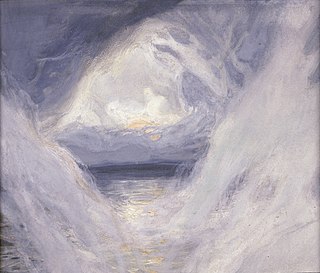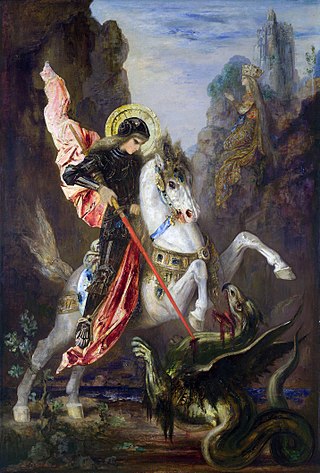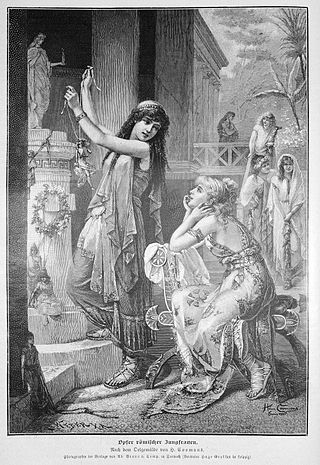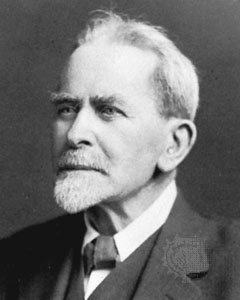Related Research Articles

A creation myth or cosmogonic myth is a type of cosmogony, a symbolic narrative of how the world began and how people first came to inhabit it. While in popular usage the term myth often refers to false or fanciful stories, members of cultures often ascribe varying degrees of truth to their creation myths. In the society in which it is told, a creation myth is usually regarded as conveying profound truths – metaphorically, symbolically, historically, or literally. They are commonly, although not always, considered cosmogonical myths – that is, they describe the ordering of the cosmos from a state of chaos or amorphousness.

Christian mythology is the body of myths associated with Christianity. The term encompasses a broad variety of legends and narratives, especially those considered sacred narratives. Mythological themes and elements occur throughout Christian literature, including recurring myths such as ascending a mountain, the axis mundi, myths of combat, descent into the Underworld, accounts of a dying-and-rising god, a flood myth, stories about the founding of a tribe or city, and myths about great heroes of the past, paradises, and self-sacrifice.

Paganism is a term first used in the fourth century by early Christians for people in the Roman Empire who practiced polytheism, or ethnic religions other than Judaism. In the time of the Roman Empire, individuals fell into the pagan class either because they were increasingly rural and provincial relative to the Christian population, or because they were not milites Christi. Alternative terms used in Christian texts were hellene, gentile, and heathen. Ritual sacrifice was an integral part of ancient Graeco-Roman religion and was regarded as an indication of whether a person was pagan or Christian. Paganism has broadly connoted the "religion of the peasantry".
Religion is a range of social-cultural systems, including designated behaviors and practices, morals, beliefs, worldviews, texts, sanctified places, prophecies, ethics, or organizations, that generally relate humanity to supernatural, transcendental, and spiritual elements—although there is no scholarly consensus over what precisely constitutes a religion. Different religions may or may not contain various elements ranging from the divine, sacredness, faith, and a supernatural being or beings.
Religion and mythology differ in scope but have overlapping aspects. Both are systems of concepts that are of high importance to a certain community, making statements concerning the supernatural or sacred. Generally, mythology is considered one component or aspect of religion. Religion is the broader term: besides mythological aspects, it includes aspects of ritual, morality, theology, and mystical experience. A given mythology is almost always associated with a certain religion such as Greek mythology with Ancient Greek religion. Disconnected from its religious system, a myth may lose its immediate relevance to the community and evolve—away from sacred importance—into a legend or folktale.

A solar deity or sun deity is a deity who represents the Sun or an aspect thereof. Such deities are usually associated with power and strength. Solar deities and Sun worship can be found throughout most of recorded history in various forms. The Sun is sometimes referred to by its Latin name Sol or by its Greek name Helios. The English word sun derives from Proto-Germanic *sunnǭ.
A creator deity or creator god is a deity responsible for the creation of the Earth, world, and universe in human religion and mythology. In monotheism, the single God is often also the creator. A number of monolatristic traditions separate a secondary creator from a primary transcendent being, identified as a primary creator.

Comparative religion is the branch of the study of religions with the systematic comparison of the doctrines and practices, themes and impacts of the world's religions. In general the comparative study of religion yields a deeper understanding of the fundamental philosophical concerns of religion such as ethics, metaphysics and the nature and forms of salvation. It also considers and compares the origins and similarities shared between the various religions of the world. Studying such material facilitates a broadened and more sophisticated understanding of human beliefs and practices regarding the sacred, numinous, spiritual and divine.
Proselytism is the policy of attempting to convert people's religious or political beliefs. Carrying out attempts to instill beliefs can be called proselytization.

Sir James George Frazer was a Scottish social anthropologist and folklorist influential in the early stages of the modern studies of mythology and comparative religion.
The world's principal religions and spiritual traditions may be classified into a small number of major groups, though this is not a uniform practice. This theory began in the 18th century with the goal of recognizing the relative levels of civility in different societies, but this practice has since fallen into disrepute in many contemporary cultures.
Lithuanian mythology is the mythology of Lithuanian polytheism, the religion of pre-Christian Lithuanians. Like other Indo-Europeans, ancient Lithuanians maintained a polytheistic mythology and religious structure. In pre-Christian Lithuania, mythology was a part of polytheistic religion; after Christianisation mythology survived mostly in folklore, customs and festive rituals. Lithuanian mythology is very close to the mythology of other Baltic nations – Prussians, Latvians, and is considered a part of Baltic mythology.

Religious cosmology is an explanation of the origin, evolution, and eventual fate of the universe from a religious perspective. This may include beliefs on origin in the form of a creation myth, subsequent evolution, current organizational form and nature, and eventual fate or destiny. There are various traditions in religion or religious mythology asserting how and why everything is the way it is and the significance of it all. Religious cosmologies describe the spatial lay-out of the universe in terms of the world in which people typically dwell as well as other dimensions, such as the seven dimensions of religion; these are ritual, experiential and emotional, narrative and mythical, doctrinal, ethical, social, and material.

The beliefs and practices of African people are highly diverse, including various ethnic religions. Generally, these traditions are oral rather than scriptural and are passed down from one generation to another through folk tales, songs, and festivals, and include beliefs in spirits and higher and lower gods, sometimes including a supreme being, as well as the veneration of the dead, and use of magic and traditional African medicine. Most religions can be described as animistic with various polytheistic and pantheistic aspects. The role of humanity is generally seen as one of harmonizing nature with the supernatural.
The term Abrahamic religion is an irenic category to group the three major religions Judaism, Christianity and Islam together, due to their historical coexistence and competition, based around a figure Abraham, mentioned in the Hebrew Bible, the Christian Bible, and the Quran. It is used to show similarities between those religions and put them in contrast to Indian religions, Iranian religions, and the East Asian religions, although other religions and belief-systems may include a figure of Abraham as well.
In religious studies and folkloristics, folk religion, popular religion, traditional religion or vernacular religion comprises various forms and expressions of religion that are distinct from the official doctrines and practices of organized religion. The precise definition of folk religion varies among scholars. Sometimes also termed popular belief, it consists of ethnic or regional religious customs under the umbrella of a religion; but outside official doctrine and practices.

Norse, Nordic, or Scandinavian mythology, is the body of myths belonging to the North Germanic peoples, stemming from Old Norse religion and continuing after the Christianization of Scandinavia, and into the Nordic folklore of the modern period. The northernmost extension of Germanic mythology and stemming from Proto-Germanic folklore, Norse mythology consists of tales of various deities, beings, and heroes derived from numerous sources from both before and after the pagan period, including medieval manuscripts, archaeological representations, and folk tradition. The source texts mention numerous gods such as the thunder-god Thor, the raven-flanked god Odin, the goddess Freyja, and numerous other deities.
Myth is a genre of folklore or theology consisting primarily of narratives that play a fundamental role in a society, such as foundational tales or origin myths. For folklorists, historians, philosophers or theologians this is very different from the use of "myth" which simply meaning something that is not true. Instead, the truth value of a myth is not a defining criterion.

Bantu religion is the system of beliefs and legends of the Bantu people of Africa. Although Bantu peoples account for several hundred different ethnic groups, there is a high degree of homogeneity in Bantu cultures and customs, just as in Bantu languages. Many Bantu cultures traditionally believed in a supreme god whose name is a variation of Nyambe/Nzambe.

A deity or god is a supernatural being considered to be sacred and worthy of worship due to having authority over the universe, nature or human life. The Oxford Dictionary of English defines deity as a god or goddess, or anything revered as divine. C. Scott Littleton defines a deity as "a being with powers greater than those of ordinary humans, but who interacts with humans, positively or negatively, in ways that carry humans to new levels of consciousness, beyond the grounded preoccupations of ordinary life".
References
- ↑ "African Mythology : Gods, Goddesses, Spirits, Legends from Africa". Godchecker.com. Retrieved 2011-12-05.
- ↑ Bouquet, Alan Coates The Christian faith and non-Christian religions. Greenwood Press. 1970. pp. 273–274. ISBN 9780837179742.
- ↑ Leeming, David Adams (2010). Creation Myths of the World: An Encyclopedia. Santa Barbara, CA: ABC-CLIO. p. 371. ISBN 978-1-59884-174-9.
- ↑ "Akongo Hides in a Forest - Oxford Reference". www.oxfordreference.com. Retrieved 2019-09-16.
- ↑ Johnson, Allen W.; Price-Williams, Douglass Richard (1996). Oedipus Ubiquitous: The Family Complex in World Folk Literature . Stanford University Press. pp. 145–146. ISBN 978-0-8047-2577-4.
